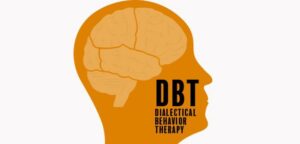If you’re looking for a DBT therapist, it’s important to do your research first. Not all therapists are created equal, and not all will be a good fit for DBT. In this blog post, we’ll discuss everything you need to know to find the right therapist for you. We’ll cover topics such as what DBT is, how it can help, and how to choose the right therapist. So if you’re ready to start your search for a DBT therapist, read on!
Contents
Who Is A DBT Therapist?
 A DBT therapist is a mental health professional who has been trained in the delivery of Dialectical Behavior Therapy. DBT therapists are typically either licensed psychologists, clinical social workers, or psychiatrists. It is believed that DBT therapists can provide patients with the skills necessary to cope with difficult emotions and situations.
A DBT therapist is a mental health professional who has been trained in the delivery of Dialectical Behavior Therapy. DBT therapists are typically either licensed psychologists, clinical social workers, or psychiatrists. It is believed that DBT therapists can provide patients with the skills necessary to cope with difficult emotions and situations.
For example, a therapist with a DBT specialty may help a patient who is struggling with suicidal thoughts to develop a plan for managing those thoughts. The therapist might also guide how to deal with triggers that might lead to self-harm. In addition, DBT therapists typically use cognitive and behavioral techniques to help patients change negative thought patterns.
If you are interested in finding a DBT therapist, it is important to know that not all therapists who claim to be experts in this type of therapy are equally qualified.
What Does A DBT Therapist Do?
A DBT therapist provides individual therapy sessions to patients diagnosed with mental disorders and/or substance abuse issues. The goal of DBT therapy is to help the patient develop skills to cope with their emotions and improve their overall quality of life.
DBT therapists use a variety of techniques, including cognitive behavioral therapy (CBT), to help patients learn how to manage their emotions. They may also teach patients coping skills, such as stress management and problem-solving. In addition, DBT therapists may provide support to patients’ families and loved ones.
The working of DBT therapists is always to help the patient in need and to make sure that they are comfortable with the environment. DBT therapists use different techniques for their patients so that every patient can get what they need out of therapy.
The main goal for DBT therapists is to help patients develop skills that will improve their quality of life. So, if you are planning on seeing a DBT therapist, be sure to ask about their experience and training. You will find the right one for your condition.
What Techniques Do they Use?
 In each therapy type, there is a complete set of techniques that the therapist may use. In DBT, these techniques are divided into four primary modules:
In each therapy type, there is a complete set of techniques that the therapist may use. In DBT, these techniques are divided into four primary modules:
Mindfulness
Learning to become more aware of the present moment and your own thoughts, feelings, and behaviors. Mindfulness always remains a key part of DBT because it helps you to be more aware of your reactions at the moment and make better decisions about how to respond. For example, you may be more aware of your urge to binge eat when you’re feeling stressed and can make a different choice.
Interpersonal Effectiveness
Developing skills to improve communication and relationships with others. Interpersonal effectiveness is generally improved by learning how to:
- assert yourself in a situation while remaining respectful
- set boundaries
- ask for what you want
- say “no”
- stick to your values
- develop and maintain close relationships
Skills in this area are often developed by learning to:
- identify your interpersonal goals
- develop a realistic plan to achieve these goals
- effectively communicate your goals to others
- monitor your progress and make necessary adjustments to your plan
Emotional Regulation
This is generally a skill that people with borderline personality disorder (BPD) struggle with. A DBT therapist works this technique to help people with BPD develop skills to better cope with their emotions. For example, a DBT therapist might help a client to understand that their emotions are valid, but that it is not necessary to act on them impulsively. In fact, it might be helpful to put off making any decisions until the emotions have passed.
Distress Tolerance
 Distress tolerance is the ability to tolerate difficult situations without making them worse. It is about accepting reality as it is and finding ways to cope with the pain instead of numbing it or making it go away. Dialectical behavioral therapy (DBT) is a type of therapy that helps people learn these skills so they can healthily manage their emotions and behaviors.
Distress tolerance is the ability to tolerate difficult situations without making them worse. It is about accepting reality as it is and finding ways to cope with the pain instead of numbing it or making it go away. Dialectical behavioral therapy (DBT) is a type of therapy that helps people learn these skills so they can healthily manage their emotions and behaviors.
These four are the main pillars of DBT on which a DBT therapist work to help patients. It is believed that by teaching patients these skills, they will be able to better manage their emotions and behaviors. So, if you or someone you know is struggling with mental health, consider finding a DBT therapist.
What Conditions A DBT Therapist Can Treat?
There are several mental health conditions that DBT therapists can treat. The most common ones include:
- Borderline Personality Disorder: BPD is a mental illness that is characterized by impulsivity, mood swings, and difficulty regulating emotions.
- Post-traumatic Stress Disorder: PTSD is a condition that can develop after a person experiences or witnesses a traumatic event.
- Eating disorders: DBT is effective in treating eating disorders such as anorexia and bulimia. As it works to help people develop a healthy relationship with food and their bodies.
- Substance abuse: This usually people develop as a way to self-medicate their symptoms. DBT therapists can help people with substance abuse issues develop healthier coping mechanisms.
- Depression: It is considered one of the most difficult conditions to treat. But DBT is an effective treatment for depression.
- Anxiety: DBT can help people with anxiety disorders by teaching them how to manage their anxiety and cope with anxiety-provoking situations.
There are several conditions that DBT therapists can treat, the most common ones are listed below. It is important to note that DBT is considered an effective treatment for depression, which is one of the most difficult conditions to treat. So you should seek help from a DBT therapist if you are struggling with any of the conditions mentioned above.
What to Expect From DBT Therapy?
 DBT therapy usually consists of weekly individual sessions and weekly group skills training sessions.
DBT therapy usually consists of weekly individual sessions and weekly group skills training sessions.
During individual sessions, you will work with your therapist to identify and change negative thinking patterns and behaviors that are causing problems in your life. And, during skills training sessions, you will learn specific DBT skills such as mindfulness, emotion regulation, and distress tolerance. You will also have homework assignments to practice these skills between sessions.
DBT therapy can be helpful for people who have difficulty controlling their emotions or impulsive behaviors. It is often used to treat people who have Borderline Personality Disorder (BPD), but it can be helpful for people with other mental health conditions as well.
There are also other benefits that you can expect from DBT therapy. These include:
- Improved relationships
- Increased self-esteem
- Better coping skills
- Increased insight into your thoughts and behaviors
It is very important to reap all the benefits of DBT therapy by finding the right therapist. Because when you find the right therapist, DBT therapy can be a life-changing experience.
How To Find The Right One?
Finding the right DBT therapist might seem like a difficult and daunting task, but it doesn’t have to be. Here are a few things to consider that will help you find the right DBT therapist for you:
- Are they licensed and accredited? This is an important first step in finding a qualified DBT therapist. You can check with your state’s licensing board to verify their credentials.
- Do they have experience treating patients with your specific diagnosis? Make sure to ask about their experience in treating patients with your particular diagnosis.
- Do they offer individual, group, or family therapy? Depending on your needs, you may prefer one type of therapy over another.
- What is their treatment philosophy? It’s important that you find a therapist whose treatment philosophy aligns with your own beliefs.
- Do they have a solid understanding of DBT? Make sure to ask about their training and experience in administering DBT.
These are just a few things to consider when searching for the right DBT therapist. By taking the time to find a qualified and experienced therapist, you increase your chances of success in treatment. Also, you need to take your time and research your options to find the best therapist for you.
Trust your instincts and go with your gut feeling. You know yourself better than anyone else, so if something doesn’t feel right, move on to someone else. With a little effort, you’ll be sure to find the right DBT therapist for you. And there is no shame in seeking treatment. Remember, you are not alone. Mental illness is nothing to be ashamed of, and recovery is possible.
Conclusion
Conclusively, a DBT therapist is someone who can provide you with the necessary tools to manage your emotions better. They can be of utmost benefit, especially if you have suicidal thoughts or tendencies. For example, they can help you develop a crisis plan and support you in sticking to it.
If you are considering DBT therapy, make sure to do your research and find a therapist that is experienced and qualified. In addition, be sure to ask questions and get a feel for whether or not the therapist is someone you would be comfortable working with. You may also want to consult with your primary care physician or a mental health professional to get their opinion on whether DBT therapy is right for you.
For more information and tips you can contact Therapy Mantra. The team of professionals can help you in finding the right DBT therapist. You can also check out our website for more blogs on mental health. Contact us today to learn more about our services. You can also book an online therapy session or download our free Android or iOS app.


